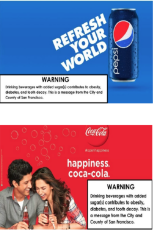
Supporters of regulations to reduce consumption of sugary drinks may feel a chilling wind in San Francisco. Just last month, a three-judge panel of the US Ninth Circuit Court of Appeals ruled that the city government’s warning label about the health of sugar-sweetened beverages violates First Amendment protections for commercial speech.
In June 2015, San Francisco passed an ordinance, S.F. Health Code § 4203(a), to mandate a health warning statement on certain sugar-sweetened beverages (“SSB”) advertisements, including billboards and vehicles:
WARNING: Drinking Beverages with added sugars(s) contributes to obesity, diabetes, and tooth decay. This is a message from the City and County of San Francisco.
The ordinance provides details about the form, content, and placement of the warning, including the controversial requirement that it occupy 20 percent of the ad space. The industry, represented by the American Beverage Association, California Retailers Association, and the California State Outdoor Advertising Associations (“associations”) , alleged the content of the warning is misleading and the 20% size requirement places an undue burden on their commercial speech. (See the sample advertisements provided by the industry to the court below)
On 19 September 19, 2017, the United States Court of Appeals, Ninth Circuit, reversed and remanded a previous district court decision which denied the associations’ motion for a preliminary injunction against the implementation of the warning label. The Court of Appeals concluded that the associations are “likely to succeed on the merits of their claims that the ordinance is an “unjustified or unduly burdensome disclosure requirement” in violation of “protected commercial speech.” Therefore, the court held, the district court “abused its discretion in denying the Associations’ motion for a preliminary injunction”.
Perhaps more concerning to public health advocates, the court also found that the required warning statement is not “purely factual and uncontroversial”. The court held that, because the FDA deems sugar “generally recognized as safe” and recognizes that it “can be a part of a healthy dietary pattern when not consumed in excess amounts,” San Francisco’s warning is therefore misleading. The judgment suggests that the warning might survive scrutiny if it used qualified language such as: “overconsumption” of sugar-sweetened beverages “may” contribute to obesity, diabetes, and tooth decay
Furthermore, the appeal court held, the warning is “misleading and, in that sense, untrue,” because it singles out SSB rather than including “all other products with equal or greater amounts of added sugars and calories.” This implies that SSBs are less healthy than other products with added sugars, which is “deceptive in light of the current state of research on this issue.”
Although the ruling could still be appealed, or San Francisco could revise its warning in line with the judgment, this ruling may have a chilling effect on efforts to nudge towards healthier choices through warning labels.



